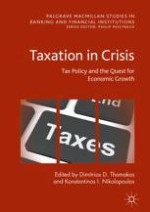2017 | OriginalPaper | Chapter
8. Tax Evasion, Tax Administration, and the Impact of Growth: Tax Enforcement as Regulatory Failure in a High Tax Rates, High Tax Evasion, and Low-Growth Economic Environment
Authors : Yiolanda Vasilopoulou, Dimitrios D. Thomakos
Published in: Taxation in Crisis
Publisher: Springer International Publishing
Activate our intelligent search to find suitable subject content or patents.
Select sections of text to find matching patents with Artificial Intelligence. powered by
Select sections of text to find additional relevant content using AI-assisted search. powered by
